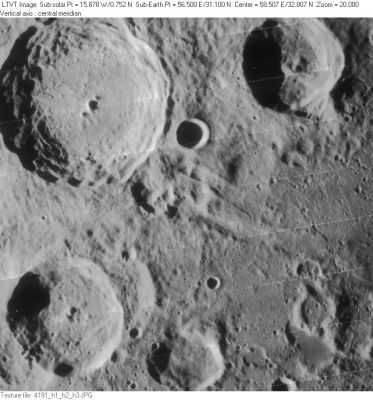Rima Burckhardt
Contents
[hide]Rima Burckhardt
(discontinued? IAU name)
| Lat: 32.7°N, Long: 59.3°E, Diam: 107 km, Depth: , Rükl: 16 |
LO-IV-191H The large crater in the upper left is Geminus. To its right is Bernoulli, and in the lower left is Burckhardt. Rima Burckhardt I, one of three rilles associated with Burckhardt in the original IAU Nomenclature runs across the frame from the unnamed crater on the southeast edge of Geminus to just north of the unnamed crater with the raised edge near the right margin. To the north of Rima Burckhardt I, there is a transition from smooth low terrain to a rougher highland (most obvious just south of Bernoulli). This is regarded as on the "Geminus ring" of the Crisium Basin, which is to the south.
Images
LPOD Photo Gallery Lunar Orbiter Images
Maps
(LAC zone 28D) USGS Digital Atlas PDF (not labeled); also partially seen, but not labeled, on LAC-44
- Rima Burckhardt I was mapped by Neison and by Arthur et al. (neither of whom seems to have gotten the angle quite right):
(click to see larger versions of these zero-libration north-up views from the LPOD Notes pages for June 23, 2008) - Rima Burckhardt I is also prominent on Rükl's map.
Description
As described by Elger, the former(?) Rima Burckhardt I appears to consist of two parallel graben-type rilles. As shown in the Lunar Orbiter IV-191H, the rilles are near one of the rings of the Crisium Basin, but not concentric with it.
Description: Elger
(IAU Directions) GEMINUS.-- ... Two fine clefts are easily visible within the ring, one running for some distance on the S.W. side of the floor, mounting the inner slope of the S.E. border to the summit ridge (where it is apparently interrupted), and then striking across the plain in a S.E. direction. Here it is accompanied for a short distance by a somewhat coarser companion, running parallel to it on the N.
Description: Wikipedia
Additional Information
Nomenclature
- Named after the nearby crater (Burckhardt).
- The original IAU nomenclature of Blagg and Müller (1935) included three Roman-numeraled rilles associated with Burckhardt. The present feature was Rima Burckhardt I, and is described as running from Geminus to Geminus Gamma (a now obsolete name for one of the ring of elevations to the east of Burckhardt). It was apparently first described by Neison. Rima Burckhardt II and III (names attributed to Schmidt) seem to have referred to the "ears" of Burckhardt, now known as Burckhardt E and F.
- In the System of Lunar Craters, Rima Burckhardt II and III were replaced by the lettered crater names, but Rima Burckhardt I was retained and labeled on Quad Map A2. It was not labeled on the LAC maps, although the chart on which its center would have been depicted (LAC-28) was never completed.
- Rima Burckhardt I is plotted and labeled on four different pages of NASA SP-241, each time in a different way. Only on p. 387 ("177-2.3") is it drawn as described in Named Lunar Formations and Neison. On pp. 43, 58 and 411 it is shown curving to the south, ending a little to the west or east of Burckhardt C (the small, deeply shadowed, circular crater to the east of Burckhardt).
- The name does not appear in the original IAU Planetary Gazetteer on which the current on-line version is based. Whether this was an intentional omission, or not, is unknown. The name is also not listed in NASA's parallel effort RP-1097 (a non-IAU publication). But there does not appear to be any record of the name having been formally dropped.
LPOD Articles
visible in: A Single Twin An Older Tycho
Bibliography


